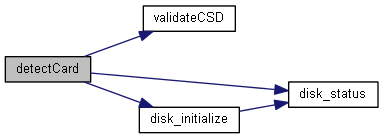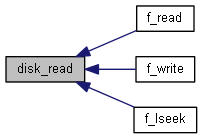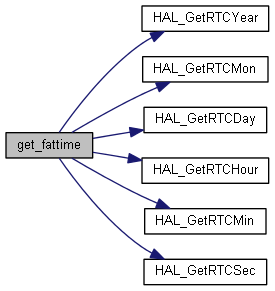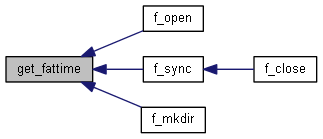Include dependency graph for diskio.c:

Go to the source code of this file.
Macros | |
| #define | INIT_PORT() HAL_SPI_Init() /* Initialize MMC control port */ |
| #define | FAST_MODE() SYS_MMC_FastMode() /* Maximize SD Card transfer speed */ |
| #define | DLY_US(n) __delay_cycles(n * 12) |
| #define | CS_H() SYS_MMC_DeselectCard() /* Set MMC CS "high" */ |
| #define | CS_L() SYS_MMC_SelectCard() /* Set MMC CS "low" */ |
| #define | WP (0) /* Card is write protected (yes:true, no:false, default:false) */ |
| #define | CMD0 (0) /* GO_IDLE_STATE */ |
| #define | CMD1 (1) /* SEND_OP_COND */ |
| #define | ACMD41 (0x80 + 41) /* SEND_OP_COND (SDC) */ |
| #define | CMD8 (8) /* SEND_IF_COND */ |
| #define | CMD9 (9) /* SEND_CSD */ |
| #define | CMD10 (10) /* SEND_CID */ |
| #define | CMD12 (12) /* STOP_TRANSMISSION */ |
| #define | ACMD13 (0x80 + 13) /* SD_STATUS (SDC) */ |
| #define | CMD16 (16) /* SET_BLOCKLEN */ |
| #define | CMD17 (17) /* READ_SINGLE_BLOCK */ |
| #define | CMD18 (18) /* READ_MULTIPLE_BLOCK */ |
| #define | CMD23 (23) /* SET_BLOCK_COUNT */ |
| #define | ACMD23 (0x80 + 23) /* SET_WR_BLK_ERASE_COUNT (SDC) */ |
| #define | CMD24 (24) /* WRITE_BLOCK */ |
| #define | CMD25 (25) /* WRITE_MULTIPLE_BLOCK */ |
| #define | CMD41 (41) /* SEND_OP_COND (ACMD) */ |
| #define | CMD55 (55) /* APP_CMD */ |
| #define | CMD58 (58) /* READ_OCR */ |
Functions | |
| DWORD | get_fattime (void) |
| DSTATUS | disk_status (BYTE drv) |
| uint8_t | validateCSD (void) |
| unsigned char | detectCard (void) |
| DSTATUS | disk_initialize (BYTE drv) |
| DRESULT | disk_read (BYTE drv, BYTE *buff, DWORD sector, BYTE count) |
Variables | |
| BYTE | INS = 1 |
Macro Definition Documentation
| #define ACMD23 (0x80 + 23) /* SET_WR_BLK_ERASE_COUNT (SDC) */ |
| #define CS_H | ( | ) | SYS_MMC_DeselectCard() /* Set MMC CS "high" */ |
| #define CS_L | ( | ) | SYS_MMC_SelectCard() /* Set MMC CS "low" */ |
| #define FAST_MODE | ( | ) | SYS_MMC_FastMode() /* Maximize SD Card transfer speed */ |
| #define INIT_PORT | ( | ) | HAL_SPI_Init() /* Initialize MMC control port */ |
| #define WP (0) /* Card is write protected (yes:true, no:false, default:false) */ |
Function Documentation
| unsigned char detectCard | ( | void | ) |
Definition at line 360 of file diskio.c.
{
//Check for a valid CSD response
if (validateCSD()){
disk_status(0); //Update the INS variable
return ( 1) ; //Card is present
}
//We didn't get a valid response. So we now know the status is one of two things:
//a) The card isn't there at all;
//b) or, it was just inserted recently, and needs to be initialized
INS = 0x01; //Trick disk_initialize into thinking it's inserted...
disk_initialize(0); //Attempt to initialize it
disk_status(0); //Update the INS variable
}
Here is the call graph for this function:

Definition at line 386 of file diskio.c.
{
#pragma diag_suppress=Pe550
BYTE n, ty, cmd, buf[4];
UINT tmr;
DSTATUS s;
INIT_PORT(); /* Initialize control port */
s = disk_status(drv); /* Check if card is in the socket */
if (s & STA_NODISK){
return ( s) ;
}
CS_H();
for (n = 10; n; n--){rcvr_mmc(buf, 1); /* 80 dummy clocks */
}
ty = 0;
rcvr_mmc(buf, 4); /* Get trailing return value of R7 resp */
if (buf[2] == 0x01 && buf[3] == 0xAA){ /* The card can work at vdd range of 2.7-3.6V */
for (tmr = 1000; tmr; tmr--)
{ /* Wait for leaving idle state (ACMD41 with HCS bit) */
if (send_cmd(ACMD41, 1UL << 30) == 0){
break;
}
DLY_US(1000);
}
rcvr_mmc(buf, 4);
}
}
} else { /* SDv1 or MMCv3 */
if (send_cmd(ACMD41, 0) <= 1){
} else {
}
for (tmr = 1000; tmr; tmr--)
{ /* Wait for leaving idle state */
if (send_cmd(ACMD41, 0) == 0){
break;
}
DLY_US(1000);
}
ty = 0;
}
}
}
CardType = ty;
deselect();
if (ty){ /* Initialization succeded */
FAST_MODE();
s &= ~STA_NOINIT;
} else { /* Initialization failed */
s |= STA_NOINIT;
}
Stat = s;
return (s);
}
Here is the call graph for this function:

Here is the caller graph for this function:

Definition at line 461 of file diskio.c.
{
DSTATUS s;
s = disk_status(drv);
if (s & STA_NOINIT){
return ( RES_NOTRDY) ;
}
if (!count){
return ( RES_PARERR) ;
}
if (!(CardType & CT_BLOCK)){
sector *= 512; /* Convert LBA to byte address if needed */
}
if (count == 1){ /* Single block read */
&& rcvr_datablock(buff, 512)){
count = 0;
}
} else { /* Multiple block read */
do {
if (!rcvr_datablock(buff, 512)){
break;
}
buff += 512;
} while (--count);
send_cmd(CMD12, 0); /* STOP_TRANSMISSION */
}
}
deselect();
}
Here is the call graph for this function:

Here is the caller graph for this function:

Definition at line 301 of file diskio.c.
{
DSTATUS s = Stat;
if (drv || !INS){
s = STA_NODISK | STA_NOINIT;
} else {
s &= ~STA_NODISK;
if (WP){
s |= STA_PROTECT;
} else {
s &= ~STA_PROTECT;
}
}
Stat = s;
return (s);
}
Here is the caller graph for this function:

| DWORD get_fattime | ( | void | ) |
Definition at line 35 of file diskio.c.
{
DWORD tmr;
/* Pack date and time into a DWORD variable */
tmr = (((DWORD)(HAL_GetRTCYear()-1980)) << 25)
| ((DWORD)HAL_GetRTCMon() << 21)
| ((DWORD)HAL_GetRTCDay() << 16)
return (tmr);
}
Here is the call graph for this function:

Here is the caller graph for this function:

| uint8_t validateCSD | ( | void | ) |
Definition at line 323 of file diskio.c.
{
BYTE csd0[16], csd1[16], i;
WORD sum = 0;
//Pull the CSD -- twice. If the response codes are invalid, then we know the card isn't there or initialized.
if ((send_cmd(CMD9, 0) == 0) && rcvr_datablock(csd0, 16)){
if ((send_cmd(CMD9, 0) == 0) && rcvr_datablock(csd1, 16)){
//The response codes were good -- but maybe the SPI input was just floating low. Let's evaluate the CSD data.
//First, look for all zero or all ones. If the SPI input is floating, these are the most likely outcomes.
for (i = 0; i <= 15; i++){
sum += csd0[i];
}
if (!((sum == 0) || (sum == 4096))){
//The response was a mix of 0's and 1's. Floating inputs could still do that -- but it's unlikely they'd
//produce the same pattern twice. Compare to ensure the two are identical.
i = 0;
while (i <= 15)
{
if (csd0[i] != csd1[i]){
break;
}
i++;
}
if (i > 15){
return ( 1) ;
}
}
}
}
return ( 0) ;
}
Here is the caller graph for this function:

